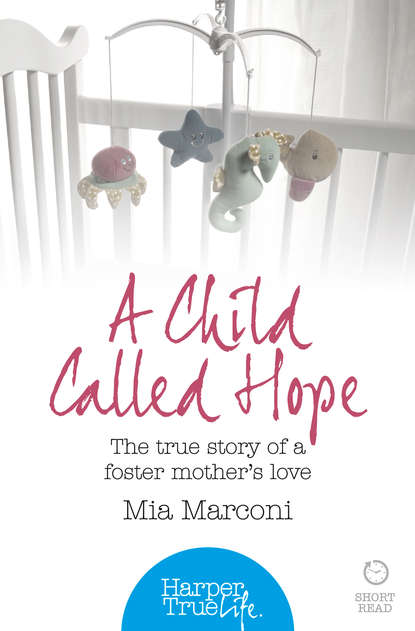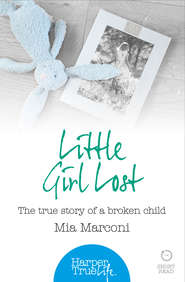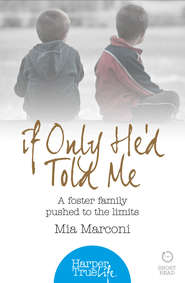По всем вопросам обращайтесь на: info@litportal.ru
(©) 2003-2024.
✖
A Child Called Hope: The true story of a foster mother’s love
Настройки чтения
Размер шрифта
Высота строк
Поля
Despite the fact that he drank and became violent, Mum idolised her dad, and he never hit his kids. He wasn’t always drunk and he loved my mum and Patrick. She remembers sitting on his knee and feeling the rough stubble on his chin. She also remembers how he would sometimes bring home little bits of shrapnel for their collection and, very occasionally, produce a bag of sweets from deep in his jacket pocket.
My granddad was an ambulance driver during the war, so he must have seen some terrible things after the bombing raids. People with their arms and legs blown off; bodies unrecognisable because they had been blown to smithereens; dead children and babies. No wonder he drank; there was no counselling in those days to help him deal with the horrors, just brown ale.
All that horror wasn’t the reason he committed suicide, though. It was a year before the end of the war and the rumour was that my nan was having an affair, and someone who was out to make trouble sent Granddad a poison-pen letter telling him so. Not long after that, he took his own life. He was depressed, he’d had enough, and he put his head in the gas oven. A lot of people said it was a cry for help and that he had not really meant to kill himself, but he did.
Mum remembers the day he died as though it were yesterday. She was seven and Patrick would have been six at the time. They walked in from school, hand in hand as usual – they always held hands – and opened the door to find the house eerily quiet. Not only was it quiet, but also the smell of gas was so strong it was choking. She opened the door to their tiny kitchen, looking around for a welcoming, familiar face, only to see her father slumped on the floor, lying absolutely still next to the cooker and clutching the letter in his left hand. The oven door was open and the gas was turned on full. Mum knew enough to turn off the gas and open a window, then she touched him, but his hands were as cold as ice. She called his name, but he didn’t answer. He was dead. Panicking, she froze, pulled Patrick to her and fell to the floor next to her dad, not knowing what to do. Occasionally she whispered, ‘Dad, Dad,’ and shook him but got no response. She has no idea how long she sat there, but she stayed where she was, rocking Patrick, in shock, until her grown-up sisters came home from work and gently lifted her off the floor.
After that, my nan, Hetty, suffered a nervous breakdown. You can only imagine the torment she must have suffered. No one ever knew whether she was having an affair, but in those days, as far as everyone else was concerned, there was no smoke without fire. My granddad knew that; he felt shamed and he took his own life.
Nan blamed herself for his death and the guilt would have been terrible, particularly as she was a Catholic. Suicide is a sin for Catholics. Their belief is that my granddad would have gone straight to Hell, and Nan would have felt responsible for his eternal damnation, no matter how often she went to church and confessed to the priest, and no matter how many times she said the rosary. And though the family tried hard, they never found out who sent that poison-pen letter.
So it’s not surprising that Nan fell apart after Granddad’s death. And from then on, she could not look after Mum and Patrick. They were the youngest of five, and there were ten years between them and their older siblings, but it still meant that my grandmother had five mouths to feed on her own, and even though the older ones helped, it was hard work.
The family decided it would be best if Mum and Patrick were evacuated, so they were sent away to live with foster carers in Wales until things calmed down. It was 1944, the war was still raging and there was always the threat of a direct hit from German bombs. Nan welcomed that for herself – she thought she deserved it – but she could not bear the thought that if her children stayed, God could punish her by taking them too.
Wales was a million miles away from London in those days and my mum and Patrick arrived at the railway station with their gas masks round their necks and brown luggage labels tied to their coats with their names and dates of birth written on them. They were bewildered and bereaved, and every comfort they had ever known was back among the bombsites of Catford.
If luck, or God, had been on their side, their temporary family would have been welcoming and kind. They dreamed they would be placed with a baker and his wife who served sticky buns for tea on a Sunday, but the couple they ended up with were cruel and uncaring. Their favourite punishment was to lock them in the garden shed for minor misdemeanours. Mum said it was dark, damp and full of spiders, with shadows everywhere, and she was terrified in there. Her main concern was protecting her younger brother, who was just as scared as she was. To pass the time, she made up stories for him, happy tales about ice cream and lollipops, of unexploded bombs and sunny days in Catford. She very quickly learned not to cry – they both did, because if they cried they would be made to stay in the shed until they stopped.
Both children were totally dazed. It was as if they, too, were being punished for their dad’s death. That whole episode in Mum’s life was a massive trauma, one she never forgot, and it ultimately shaped the person she became.
Chapter Three (#u1a524f06-fc1d-5ccb-9534-a21e0becfa07)
Mum and Dad had both had difficult childhoods, and they were also incredibly young to start a family; Dad was only seventeen when he married Mum, who was only sixteen herself. When my sister Rosa was born, Dad was eighteen, and only nineteen by the time I was born. He was the ripe old age of twenty-two when my brother Joe arrived, and twenty-three when Mum gave birth to Bianca.
Mum’s two older sisters, Lily and Daisy, were very successful in their own fields: Daisy in fashion, and Lily, the stunning beauty of the family, was a secretary for a big furniture company. They had got out of poverty, married quite wealthy men and had good careers. Mum was the poor one in the family and her sisters kept her financially while my nan, Hetty, helped her look after us.
Nan thought Dad was not good enough for my mum, so she continually told her, in front of my dad: ‘You are never going to have anything, because you’ve married a foreigner.’ Dad struggled to fit in as it was. He got called ‘English’ in Italy and in London they called him ‘Spaghetti’ or ‘Wop’. Wop was a derogatory term used for Italian immigrants. It was short for ‘Without Papers’, as many had come over without identity papers, and was common slang in the Sixties and Seventies. Not surprisingly, it upset Dad a lot.
It just brought home to Dad that he wasn’t really Italian and he wasn’t really English. Nan knew my dad never felt as though he fitted in and that the word ‘foreigner’ would really hurt him. It cut deep and she knew it. That’s why she said it.
Dad could never do anything right and all Mum’s family used to argue with him. If he spoke back, Nan would get up and roll up her sleeves. ‘Get outside!’ she would shout at him, and she would honestly have taken him on if he had gone with her. Instead, Dad would do the sensible thing and storm off until it all settled down. I dread to think what would have happened if they had come to blows.
Nan was a tiny grey-haired woman. She may have survived the war, but she was still deeply affected by her husband’s suicide, although she would never show it or talk about it. Since his death she had done nothing but work hard and care for her family, and every bit of softness and compassion in her had been trampled on. There was no doubt she could be a cow. If Mum brought a friend home, Nan would say: ‘Come on, clear off, she’s got things to do.’
There was only one way that Hetty showed her love and that was through control. She had to be in charge and no one messed with her – they didn’t dare. Hetty ruled the family with an iron rod and no one had better step out of line.
Although she could be terrifying at times, she was always there looking after us while Mum was at work, and I idolised her, simply because she was my nan and she was there for us.
My mum is a petite redhead with a lovely figure and a good sense of humour – if they had started making EastEnders in the 1950s, her family would have been mistaken for the cast.
You can imagine how volatile an Irish-Italian household could be, and Mum and Dad would often throw things at each other. They’d be having dinner and one of them would say something, and then, suddenly, there would be plates flying across the kitchen or saucepans being thrown at people’s heads.
Mum threw as many saucepans as my dad, but neither of them ended up in hospital. Arguments and fights became so regular in our house, we thought it was normal. We thought everyone’s parents fought all the time and threw things at each other.
It always seemed to me that my mum started the fights, but I suspect she was reacting out of frustration with my dad. Although they fought like heavyweight champions, they never gave up on each other, which is so easy to do now. I like to think that they loved and needed one another and fought to keep the family together, rather than ripping it apart. I don’t like to think that the fights had no purpose.
It is true that Dad was very violent and aggressive – not towards me, but towards my mum. As a child, I didn’t really understand why Dad was so needy, but it was because Mum could never give him as much love as he needed. I actually don’t think anyone could have, he was so damaged, so they would end up pushing each other around and me and Rosa would get in between them and try to calm them down, while Joe and Bianca sat on the sofa looking sad.
Like lots of other Italian immigrants, Dad worked at an Italian restaurant, but there was never any money. Dad was a gambler, so they had lots of money worries. He loved to bet on the horses, but he would also bet on football – anything, really – and his pockets were always full of little white gambling slips that he brought home from the bookies. He lost more often than not, but you knew when he had won, because he would come home with presents. If he had lost, he could go missing for days at a time.
Dad probably shrugged off a lot of responsibility, because my mum had her family network to support her, so why was he needed? When her family used to argue with him, I was always his ally and stuck up for him. He was never wrong in my eyes; he was never wrong until I was in my late thirties and I started to understand what kind of life my mum must have had with him.
I used to think Mum was mean and I hated her for shouting at Dad, but what I didn’t think about when I was a child was how much responsibility she had. I never understood my mother; all I knew was that my dad made me feel like I was the most special child in the world, and whatever I did wrong, he stood by me. My mum, on the other hand, had three jobs and four kids by the time she was twenty-two and she had no time to mollycoddle me. Not only that, she had a husband who gambled away his wages. If only I had taken that on board while I was growing up, I might have been able to understand the stress and strain she was under and given her an easier time. Instead, I was always angry with her for shouting at my dad. What chance did Mum have with me? She would have got more response if she had tried to reason with the cooker.
Dad should have been the main breadwinner, but the responsibility for putting food on the table was down to Mum. She was exhausted half the time, because when she wasn’t at home looking after us she was working shifts in the local pub or in the café, and when she wasn’t doing that she cleaned the local school.
Somehow, their relationship survived, but Mum got no sympathy from Nan. It didn’t matter how many plates got broken or how many saucepans got dented, how often she saw my mum sobbing her heart out or how often my dad went missing; Nan’s response was always the same: ‘You’ve made your bed, you lie on it.’
Was she right? I would say she was, because although it seemed harsh, she kept the family unit together.
We lived in Bermondsey at the time in a two-up, two-down. We had no boiler and no hot water upstairs, so we attached a hosepipe to the downstairs tap, threaded it out of the kitchen window and threw it up at the bathroom window until somebody caught it and we could fill the bath. The big problem was that by the time the bath was full, the water was lukewarm. The bathroom was freezing anyway, because you had to have the window open, so we sat and shivered as we washed ourselves clean. Even now, I can bath myself in two minutes flat.
I went to a Catholic school, obviously – being from an Irish-Italian background I would not have gone anywhere else – but I hated the nuns. I remember when I was about six, walking along the corridor to a class and because I started talking I was dragged out of the line. I had no idea I was doing anything wrong, but the next minute I remember getting the cane on my hand in the head teacher’s office. Four times she hit me with full force. She didn’t care that I was little; she held nothing back. The head teacher was a nun, and she was so terrifying I remember wetting myself, and then getting the cane again for wetting myself. I got no sympathy when I started crying; I was simply given a clean pair of knickers, told not to cry and sent back to class.
Вы ознакомились с фрагментом книги.
Приобретайте полный текст книги у нашего партнера:
Приобретайте полный текст книги у нашего партнера:








